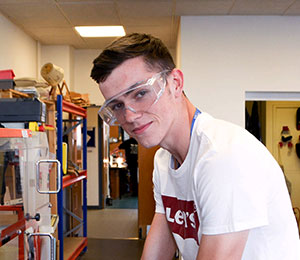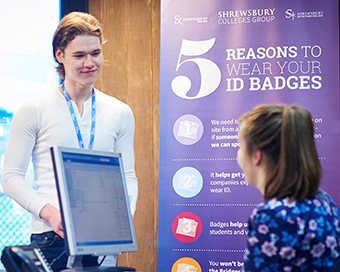General Welder – Arc Processes (Level 2 Standard)
| Mode of study | Apprenticeship |
| Duration | 1 Year |
| Campus | London Road Campus |
| Start date | 1 August 2022 |
| Course code | PLR2UFW (APPO) |
-
Who is it for?
Welding is a way to make high strength joints between two or more parts. General Welders use high electrical energy to form an arc. Manual dexterity is essential in controlling the arc, which is used to melt metals, allowing them to fuse together to form a structurally sound weld.
Welding is used extensively and in almost every sector of industry. There is a high demand for skilled General Welders in areas such as automotive, marine, transport, general fabrication, construction and many more. General Welders produce items like components for cars; ships; rail vehicles; simple metallic containers; and steelwork for bridges, buildings and gantries. Welding is a safety-critical occupation and every welder takes responsibility for the quality and accuracy of their work. General Welders are required to produce joints that satisfy basic quality standards in order to ensure that the finished products function correctly, contributing to the safety of all and the global quality of life.
Skilled, qualified, professionally certified General Welders can work anywhere in the world and provide services in harshest of environments. For these accomplished professionals, the monetary rewards can be significant.
There is a highly complex range of welding skills: the different arc welding processes require different levels of manual dexterity, knowledge and skill to avoid making defective welds. There is a wide range of metallic materials that can be welded, each with different properties and behaviours.
-
Entry Requirements
In order to complete this welding Apprenticeship, you will be expected to complete an initial assessment in Maths and English to ensure you are at a suitable level to work towards this qualification. Some employers will specify their own minimum qualification entry requirements, which would be detailed within their Apprenticeship vacancy.
-
What does the course involve?
For a comprehensive understanding of this programme and what it entails, please click here.
As part of the welding Apprenticeship Standard, if you do not hold GCSE Maths and English at grades 9-4, you will also be required to study towards your functional skills Level 2.
-
How is the course assessed?
This welding Apprenticeship is taught at our London Road campus on a day release basis, once a week. If you need to complete your functional skills, then this will be covered at college in a block week release. In addition, you will be assessed in the workplace by your assessor and progress reviewed every 12 weeks with your employer. In addition, you will be required to sit an End Point Assessment, towards the final stages of your programme, which will ensure you have obtained the skills, knowledge and behaviours required to carry out your role effectively.
-
Additional Notes
Typically, this welding Apprenticeship will take 18 months to complete.
-
What do I do next?
To be a welding apprentice, you will need an employer who can offer you a welding role and release you for your training. Once you have an employer in place, you can apply online. If after reading this fact sheet, you are still undecided about the course most suitable for you, please drop in to one of our Advice Events, ring the Apprenticeship Team on 01743 260400 or email: This email address is being protected from spambots. You need JavaScript enabled to view it.

Owen Mason
Level 3 Extended Diploma in Engineering
Previous school: Church Stretton School
I came here because I'm interested in Engineering. I really enjoyed doing my final project and having the creativity to come up with my own design and I have also enjoyed working with hydraulics. I achieved D*D*D* in my Diploma and am now going on to do an Apprenticeship. The teachers are helpful and the equipment at the College is state-of-the-art.

Beth Knight
A Level Product Design (Media Studies and Music)
Previous school: Belvidere School
I took Product Design at A Level because I was inspired by my GCSE teacher. I really enjoy how hands on the subject is and using the computers to bring your designs to life. You can explore your creative side in a relaxed environment.

Jason Roberts
A Level Product Design (Maths, Physics)
Previous school: The Priory School
Product Design gives you a lot of options for your future. I enjoyed the project where we had to make something out of a generic Ikea stool – I created an adjustable table. After College I would like to do an Apprenticeship with JLR.

Austin Luzadas
Level 3 in Engineering
Previous school: Holy Trinity School, Telford
Level 2 was mostly practical and this year on Level 3 there is a lot of theory and it's preparing me for university. I live outside of Shrewsbury and the transport links to the College are good.
Are you an employer?
See how an apprentice can help your business.








